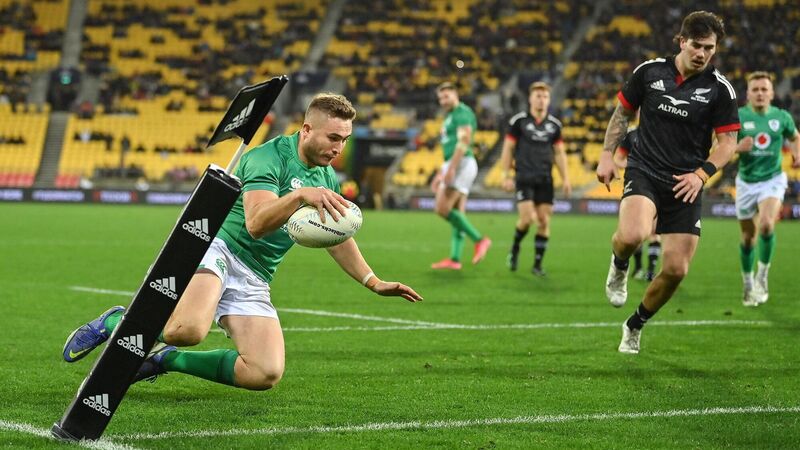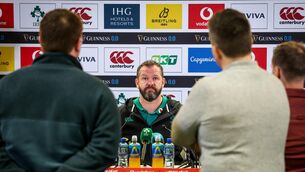Donal Lenihan: New Zealand really don't take losing very well

ON FORM: Jordan Larmour did his chances of featuring against New Zealand on Saturday no harm with two tries against the Maori All Blacks. Pic: Brendan Moran/Sportsfile
They really don’t like losing down here. They tend not to take it very well, always looking for someone or something to blame. Perhaps that’s what happens when you’re used to getting your own way on the pitch for so long.
New Zealand’s success ratio in the professional game is unrivalled. While All Black coach Ian Foster has been the main focus of the country’s ire, a small cohort even took last Saturday’s defeat out on some of the travelling Irish supporters, giving them the finger as they left the Forsyth Barr Stadium, promising revenge in Wellington next Saturday.
Some of the booing and jeering as Johnny Sexton lined up his kicks was disappointing, even if he responded in the best possible fashion, converting five from five.
In some ways it made the Irish victory all the sweeter even if we know there’s going to be a serious reaction from within the All Blacks camp, given the pressure and vitriol received in the wake of a substandard performance last time out.
The events of last weekend were not only historical from an Irish perspective but for rugby in Britain and Ireland. For the first time ever, Ireland, England, Scotland and Wales registered wins over Southern Hemisphere opposition on tour with stunning victories on the same day over New Zealand, Australia, Argentina and South Africa.
That sequence of results was even more remarkable given that all lost to the same opposition in their opening tests the previous weekend. As a consequence all four series go to the wire on Saturday. That’s incredible given that our teams are normally out on their feet at this stage of a long season, especially after a Lions year. It also offers an indication of just how competitive next year’s World Cup could be.
Even the pool stages will be spicy. Fiji, Tonga and Samoa are all involved in a Pacific Nations Cup competition at present, along with Australia A, and the standard has been really impressive. With a number of quality players being cleared by World Rugby to represent their country of birth on the back of not playing for their adopted country for over three years, their respective squads have received a massive boost.
Former All Blacks Charles Piatau and new Munster signing Malakai Fekitoa along with former Wallaby Israel Folau all started in a star studded Tongan backline but were beaten 36-0 by an incredibly talented Fijian side. Wait until the Fijians get their Sevens stars back involved.
Right now, the gap between the traditional big three of New Zealand, South Africa and Australia, who between them have won eight of the nine World Cup tournaments played since the first one back in 1987, appears tighter than ever.
Ranked number one in the world for the first time, France, who played a mix of their second and third choice players in a 2-0 series win over Japan over the last fortnight, look better placed than ever to finally win a World Cup having fallen at the last hurdle in 1987, 1999 and 2011.
That said, World Cups have a tendency to take on a life of their own, with so much depending on injuries accumulated over the course of the tournament, not to mention the impact of a referee’s decision that can change the course of not only a game but the tournament itself.
The new emphasis on punishing high tackles with the ultimate sanction in order to promote and protect the safety of the player means that every side is more open to losing someone to a red card than at any time in the history of the game.
The reaction out here, and in Australia, to the red cards issued against the Wallaby second row Darcy Swain against England in the first Test and New Zealand’s Angus Ta’avao last Saturday night is astonishing. The Aussies are the worst of all.
When their winger Marika Koroibete was sent off in the third test against France last summer, for the clearest of shoulder to head contacts on French No 8 Anthony Jelonch, their television commentators went ballistic, claiming it wasn't even a penalty.
Typically, the public reaction in New Zealand to such incidents as Ta’avao’s head clash with Garry Ringrose is that the game has gone soft. How ridiculous is that? The ferocity of the hits and tackles in the modern game have never been more explosive. The players need to be protected from themselves.
Given the increased knowledge and awareness around the impact of concussion and its long term effects, it’s only right that the authorities are looking to change the body height of players in the tackle.
That said, the controversy surrounding Sexton’s availability for the second test and the farce surrounding the Jeremy Loughman incident in the tour opener against the Maori’s, when he was clearly concussed yet let back in the field by the independent doctor, highlight once again that, despite recent changes to the rules surrounding head injury assessments, the process still isn’t right.
Andy Farrell openly declared at the outset of this tour that his planning process for the World Cup starts here. I admire the fact that he has chosen to do things the hard way. Ideally, his squad would only have one focus this week, concentrating all their energies on preparations for what is now a series decider in Wellington’s Cake Tin.
It’s far from ideal, for example, that the likes of Rob Herring, Jack Conan, Conor Murray, Joey Carbery and Mack Hanson found themselves on the bench for the Maori game last night, four days out from facing New Zealand.
Then again, that’s what touring is all about. Farrell has deliberately designed the tour to take players out of their comfort zone and present them with the type of challenges they may well have to face at a World Cup.
Everyone within this tight group was focused on the second game against the Maori All Blacks with a view towards reversing the opening tour result when they lost 32-17. Johnny Sexton’s appreciation of the wider picture was there for all to see in the press conference after Ireland made history in Dunedin.
Asked about preparations for the deciding third test, all he referenced was the importance of winning the game against the Maori the following Tuesday. The test decider could wait. He knew that for the players who didn’t get to tog off in the match day squad against the All Blacks, this is their moment to set the record straight.
Sexton was cognisant of the key role everyone outside of last weekend's match day squad played in the days leading up to the second test, running the line outs, defensive and attacking patterns of the All Blacks in training as opposition in an effort to prepare the Irish team as best as possible.
It was the job of the senior players to reciprocate that effort, recognising that many of the younger cohort on this tour were playing to leave a lasting impression on Farrell and his coaching team last night with a view to World Cup squad selection down the line.
In that respect, multi capped Jordan Larmour did his cause no harm, despite receiving a yellow card, in an energetic performance that yielded two tries. Nick Timoney was as industrious as ever, pitched in with his trade mark turnovers, carries and also scored a try while Kieran Treadwell put in another big shift in the ball winning and carrying stakes having now seen game time in all four matches on tour.
His locking partner Joe McCarthy has a massive work rate but needs to be smarter around the breakdown where his enthusiasm gets the better of him at times, leading to the concession of unnecessary penalties. He has raw talent and power and will have benefitted massively from this experience.
The fact that Ireland levelled the series against the Maori with a deserved 24-30 win, in very challenging conditions, will have pleased Farrell no end, especially as it was achieved without having to expose his front line troops on the bench, apart from a 9 minute cameo appearance from Carbery.
He really couldn’t have asked for any more from his wider squad. All eyes now on the opportunity to create even more history with a series win here in Wellington next weekend.









